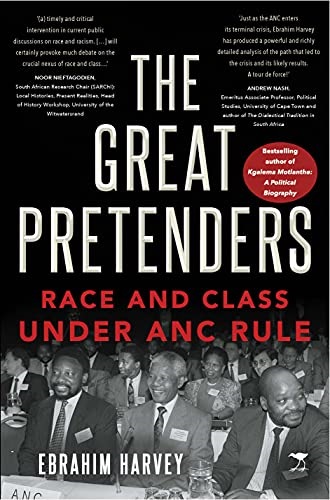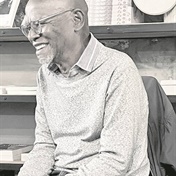
In this extract from his new book The Great Pretenders: Race and Class Under ANC Rule, Ebrahim Harvey examines the fundamental need to dismantle capitalism as the system has, he argues, wrought havoc on South Africa.
The veteran political analyst delivers a stinging critique of the ANC. His analysis reveals the complete failure of the governing party to roll back the race and class divide.
Harvey argues that a series of events – including HIV/AIDS denialism, the Marikana shootings, the Nkandla funding scandal, mass student protests, the Esidimeni tragedy, systemic corruption and state capture – are rooted in policy choices made by the ANC during negotiations and in power.
The Great Pretenders: Race and Class under ANC Rule
Ebrahim Harvey
R320
Jacana Media
Firstly, South Africa and the world will have no future worth speaking about and pursuing unless we realise that there will be no resolution of the multiple crises we face unless we break with and oppose the capitalist system, which has lived cheek by jowl with racism and gender oppression for at least 150 years.
READ: Human Rights Month 2021: black lives do not matter in South Africa
Second, unless the EFF sheds its racialist and often racist posturing and unites with other socialist forces, no matter how much smaller they might be, such as the Marxist Workers Party or the Socialist Revolutionary Workers Party, and grows into a powerful mass-based party of the majority working class – in order to win an election and replace the beleaguered ANC – our future will be imperilled, probably much more than it already is.
A great deal could be written about the disaster that capitalism has been for centuries around the world. This book has made it palpably clear that white supremacy – upon which apartheid domination was based – would not have had the tenacious power it had and the longevity it enjoyed had racism not been historically intertwined with capitalism in South Africa.
And the super-exploitable cheap black labour regime imposed by apartheid and all preceding forms of white racist rule – whose laws were consciously designed to buttress and enforce it – would not have occurred and survived had there not been a system developed which was largely of mutual interest to both Dutch and later white Afrikaner rule and mainly English white monopoly capital.
To varying degrees these protagonists benefited from what was called under apartheid “racial capitalism”, the legacy of which post-apartheid South Africa has conclusively shown is still embedded in our society, not by virtue of racist laws, as under apartheid, but as a result of the devastating social consequences that were carried over into post-apartheid neoliberal South Africa under ANC rule.
The dismal results are evident in the statistics of this country. Even when the ANC acted for the benefit of poorer citizens, such steps were undercut by their overall neoliberal approach. It was similar to the ANC giving, for example, R100 a day to an unemployed black person while the effects of neoliberal policies took back R120 a day.
The result was that people, especially of the black working class, actually grew poorer. The problem is that time is not on our side and, depending on which way we go, there is a sense – a constant reminder of which is the unbridled violence we daily see in so many areas of life – that conditions could deteriorate and result in protracted conflict, including of racial forms, which could destroy South Africa with all its beauty and rich history.
We have a country worth fighting for, but there will be nothing to fight for unless the white elite and the small black elite born after 1994 come to the realisation that they and their children will have no future unless the wealth they possess is shared with and redistributed in some form to the mostly impoverished and unemployed black working-class majority.
How that is done is another matter to be decided and perhaps also fought for, but that it must be the goal is beyond any doubt. The high number of white people killed in crime since 1994, either on their farms or in their homes in the cities, must tell them that there simply is no other way forward. Equally, the fighting spirit and resilience of black people in South Africa are acknowledged both locally and globally.
They will not rest and there will be no peace until and unless the enormous wealth is equitably shared by all. In that regard, they have suffered under both racial capitalism during apartheid and under a black majority-led neoliberal ANC government, which in some critical areas of life has made conditions worse than they were under apartheid.
This situation wields enough political and moral authority for a fundamental change in the conditions of life of those people. There cannot be a more noble fight to wage on the one side and to yield to on the other, especially given our history. The enormous resources of this country remain in white hands, which is the main reason for black poverty and multiple social injustices.
Unless in one way or another that wealth is redistributed to end such conditions of life for the majority of people in South Africa, or at least secure major changes, we might soon have a revolution that will sweep away a social order whose roots can be traced back to the Cape Colony and more directly to the mineral revolution. It is my fervent wish that this book can contribute to that fully justifiable end.
I conclude this book on a note which strikes at the heart of my arguments regarding the historically largely symbiotic relationship between race, racism and capitalist development in South Africa. Asked whether we have a non-racial society, Shaheen Khan answered:
“The system today is definitely not non-racial as the racial character and designations are still very much in place. Non-racialism is characterised by an understanding that the concept of race is not biologically or scientifically valid and that race exists as a social category to divide people so as to facilitate the system of exploitation and oppression. The ‘new’ South Africa as a capitalist system cannot be non-racial as it is based on a system of exploiting cheap black labour.”
READ: Sindile Vabaza | The roots of ANC animus towards free market ideals
In this book I showed how and why that is still the dominant and defining reality in South Africa today. I have argued too that until and unless the capitalist system, which is ultimately based on race, is transformed, whether we prefer to talk of the creation of an anti-racist or non-racial society, it will not materialise. We have seen throughout this book what 26 years of non-racialism have delivered in this country.
The sooner the capitalist class, both white and black, also comes to the realisation that poverty, multiple social injustices and raging inequalities will likely deteriorate further – especially after the impact of the Covid-19 crisis and the fourth industrial revolution, whose effects more fully lie in the years ahead – the better.
How we navigate that future nobody can say in advance, but one thing is clear, there will be little or no future worth speaking about until that reality dawns on us and until we do something about it.
The Great Pretenders: Race and Class under ANC Rule will be launched online on Wednesday, May 5 at 7pm. Harvey will be in conversation with ANC deputy secretary-general Jessie Duarte. The discussion will be moderated by political journalist Stephen Grootes. To book your spot, click on this link: https://www.crowdcast.io/e/whatever-happened-to/register
| ||||||||||||||||||||||||||||||
 |




 Publications
Publications
 Partners
Partners










